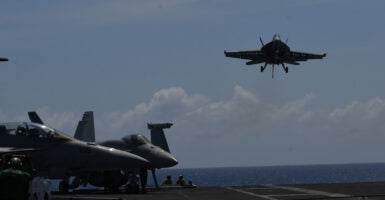DAILY CALLER NEWS FOUNDATION—The recent departure of U.S. warships from the Pacific leaves a strategic void in the crucial region as forces turn their attention to the Middle East.
The USS Lincoln Strike Group, which consists of a fleet of warships and fighter jets led by an aircraft carrier, arrived last week at the U.S. Central Command, or CENTCOM, area of operation after departing from U.S. Indo-Pacific Command earlier in August.
The USS Abraham Lincoln was the last remaining aircraft carrier in the Indo-Pacific—a flashpoint for hostilities between China and several U.S. allies—and there won’t be a replacement in the region anytime soon, according to Naval News.
Several ships from the U.S. naval armada have repositioned to the Middle East in anticipation of a flash conflict between Israel and other U.S. adversaries in the region, chiefly Iran, the world’s largest state sponsor of terrorism. Israel and the terrorist group Hezbollah, based in Lebanon, exchanged hundreds of hundreds of missiles, rockets, and drones Sunday in one of the largest cross-fire incidents between the two adversaries in months.
Following the strikes Sunday, Israel and Hezbollah signaled that they are ready to de-escalate tensions in an effort to avoid a broader regional war, according to The Wall Street Journal.
The Lincoln joined the USS Theodore Roosevelt in the CENTCOM theater to provide enhanced defense capabilities to Israel, according to the Pentagon. Other U.S. carriers that typically operate in the Indo-Pacific are either in port or in a maintenance period, according to Naval News.
There will not be any aircraft carriers in the Pacific until at least mid-September, even as China continues to pose a threat to other U.S. allies in the region, Naval News reported. China acts increasingly aggressively toward the Philippines and Taiwan, mostly over territorial disputes in the South China Sea.
Chinese coast guard ships fired water cannons and rammed Philippine fishing vessels Sunday in the South China Sea, an occurrence that has become frequent in recent months, according to The Associated Press. Elsewhere in the region, Japan accused a Chinese warplane of violating its airspace Monday for the first time in years, according to The Japan Times.
China’s poor relationship with Taiwan is long documented and seemingly getting worse, with China routinely performing military blockades around the island or violating its airspace. Chinese officials planned to voice their “serious demands” about Taiwan to U.S. President Joe Biden’s national security adviser, Jake Sullivan, during his visit this week to Beijing, Chinese state media reported Sunday.
The Pentagon did not immediately respond to a request for comment.
Originally published by the Daily Caller News Foundation





























